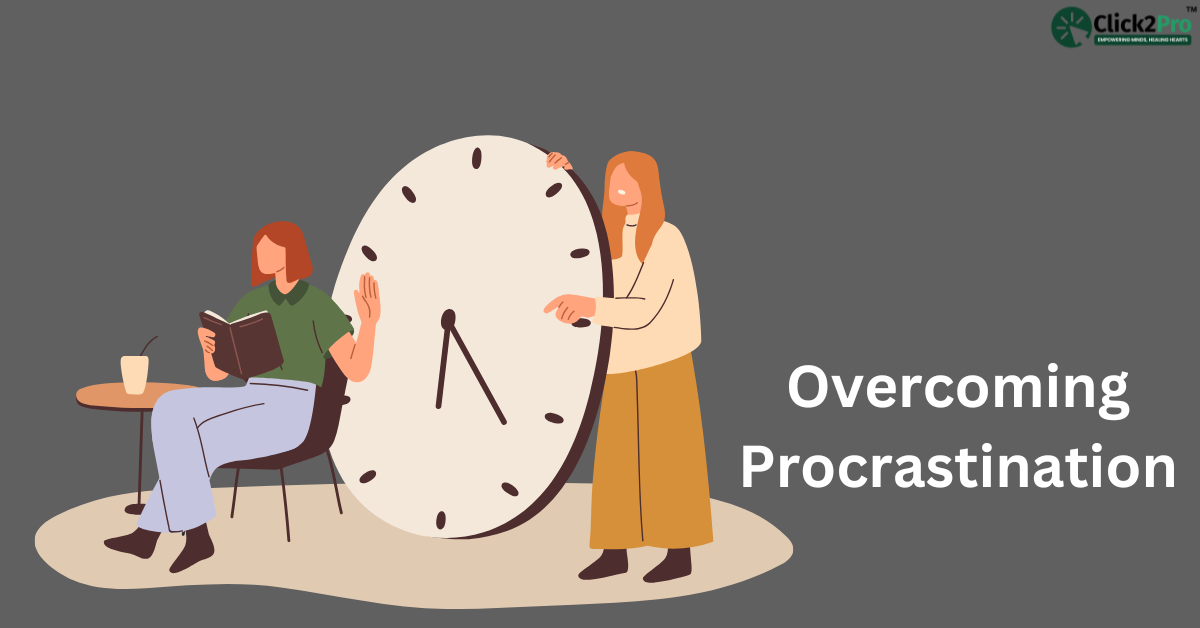
Overcoming Procrastination: Why We Delay and How to Stop
Table of Contents
Procrastination—an issue that plagues millions globally—is far more complex than simple laziness. Have you ever found yourself staring at a daunting to-do list, knowing exactly what needs to be done, yet unable to start? You're not alone. Research shows that 80% of adults and 95% of college students experience procrastination to some degree. This habit, often misunderstood, is rooted in emotional struggles like fear of failure, perfectionism, or overwhelming stress.
In India, cities like Allahabad (Prayagraj) see a rising trend in procrastination, especially among students and professionals in bustling areas such as Civil Lines and Georgetown. The fast-paced environment amplifies the tendency to delay tasks, which over time leads to decreased productivity and mental health challenges.
Why is procrastination such a universal issue?
It’s not just about poor time management—it’s tied to our brain's natural inclination to prioritize immediate gratification over long-term rewards. Overcoming this requires a combination of self-awareness, actionable strategies, and, at times, professional help.
Why Do We Procrastinate?
Procrastination stems from a mix of emotional and psychological factors. Here’s a breakdown of its primary causes:
Psychological Roots
Fear of Failure: Anxiety over the possibility of not performing well leads to avoidance.
Perfectionism: The pressure to complete tasks flawlessly can make starting them daunting.
Overwhelm: Large, complex tasks can seem insurmountable, triggering avoidance behaviors.
Scientific Theories
Temporal Motivation Theory (TMT): This theory explains how procrastination arises when immediate rewards outweigh the long-term benefits of completing a task.
Freud’s Psychoanalytic Theory: Suggests that procrastination reflects deeper unconscious conflicts, such as avoiding discomfort or fear of judgment.
Research Insights
A study by the American Psychological Association reveals that procrastination activates the brain's emotional centers, causing individuals to seek distractions that provide instant relief.
The Cost of Procrastination
Procrastination has significant consequences for productivity, mental health, and overall quality of life. Below is a comparison of its impact:
|
Area of Life |
Effects of Procrastination |
|
Mental Health |
Increased stress, anxiety, and feelings of guilt. |
|
Productivity |
Missed deadlines, poor performance, and career setbacks. |
|
Relationships |
Strained interactions due to broken commitments. |
|
Physical Health |
Linked to sleep disturbances and unhealthy coping habits. |
Mental Health in Allahabad: A Snapshot
In Allahabad, rising academic pressure and urban stress have contributed to increasing mental health concerns. Here’s what the data shows:
75% of students in Allahabad University report procrastination linked to exam stress.
Professionals in Naini industrial areas cite work-life imbalance as a significant stressor.
The National Mental Health Survey of India (2016) reported that 15% of Indians face mental health challenges, many exacerbated by procrastination.
Government Initiatives in Uttar Pradesh:
Launch of Mental Health Helpline 104, which addresses procrastination and related issues.
Collaboration with NGOs like Manas Foundation to conduct mental health workshops in schools and colleges.
Breaking the Cycle: How to Stop Procrastinating
Proven Strategies
-
Set Clear, Achievable Goals:
Break tasks into smaller, manageable steps. For instance, instead of “Write a report,” start with “Draft the introduction.”
-
Use Time Management Techniques:
Pomodoro Technique: Work for 25 minutes, followed by a 5-minute break.
Time-Blocking: Allocate specific hours for focused work.
-
Reframe Mindset:
Embrace "progress over perfection." Remember, done is better than perfect.
Government & NGO Resources
National Initiatives:
-
Ayushman Bharat: Includes mental health support services under its purview.
-
Manodarpan: Government program focusing on student mental health.
Local NGOs in Allahabad:
-
Ankuram Foundation: Provides free counselling services for students struggling with procrastination.
-
Saathi Mental Health Foundation: Offers workshops on overcoming procrastination.
Click2Pro Services: Professional Help for Procrastination
Click2Pro specializes in providing evidence-based solutions for mental health challenges, including procrastination. Here’s how their services can help:
Looking for a therapist near me to overcome procrastination? Click2Pro offers personalized online counselling to help you take the first step today.
Cognitive Behavioral Therapy (CBT):
A proven approach to identifying and addressing negative thought patterns.
Online counselling:
Convenient access for residents of Allahabad and beyond.
Impact Report:
83% of Click2Pro clients reported improved time management after therapy.
Visual Insights
Reasons for Procrastination (India)
-
Fear of Failure: 40%
-
Perfectionism: 25%
-
Overwhelm: 20%
-
Lack of Motivation: 15%
Effects of Procrastination on Mental Health
-
Stress: 70%
-
Anxiety: 65%
-
Low Self-Esteem: 50%
FAQs
1.Why do people procrastinate even when they know it’s bad?
People procrastinate due to emotional reasons like fear of failure, perfectionism, or feeling overwhelmed by tasks.
2.How can I stop procrastinating immediately?
Start by setting a timer for 5 minutes and work on the task for that duration. Often, starting is the hardest part.
3.Can procrastination affect mental health?
Yes, chronic procrastination leads to increased stress, anxiety, and lower self-esteem.
4.What are some tools to combat procrastination?
Apps like Todoist, Forest, and RescueTime can help manage tasks and reduce distractions.
Conclusion
Procrastination is a challenge, but it’s not insurmountable. By understanding its root causes and adopting proven strategies, you can take back control of your time and mental health. If procrastination feels overwhelming, professional help from Click2Pro is just a click away.
Transform Your Life with Expert Guidance from Click2Pro
At Click2Pro, we provide expert guidance to empower your long-term personal growth and resilience. Our certified psychologists and therapists address anxiety, depression, and relationship issues with personalized care. Trust Click2Pro for compassionate support and proven strategies to build a fulfilling and balanced life. Embrace better mental health and well-being with India's top psychologists. Start your journey to a healthier, happier you with Click2Pro's trusted online counselling and therapy services.






